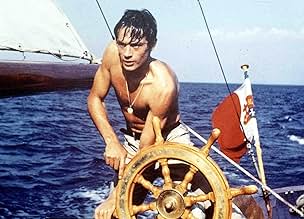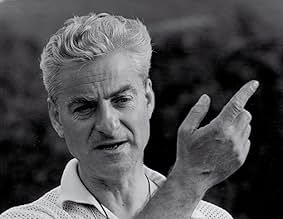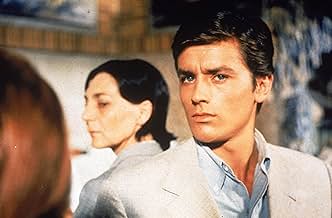AVALIAÇÃO DA IMDb
7,7/10
23 mil
SUA AVALIAÇÃO
Tom Ripley é um imitador talentoso, falsificador e improvisador criminal; mas Tom tem mais do que ele pode imaginar.Tom Ripley é um imitador talentoso, falsificador e improvisador criminal; mas Tom tem mais do que ele pode imaginar.Tom Ripley é um imitador talentoso, falsificador e improvisador criminal; mas Tom tem mais do que ele pode imaginar.
- Direção
- Roteiristas
- Artistas
- Prêmios
- 1 vitória no total
Marie Laforêt
- Marge Duval
- (as Marie Laforet)
Billy Kearns
- Freddy Miles
- (as Bill Kearns)
René Clément
- Le serveur maladroit
- (não creditado)
Walter Grant
- Bit
- (não creditado)
Paul Muller
- Blind Man
- (não creditado)
Jacqueline Parey
- Ingrid
- (não creditado)
Romy Schneider
- Freddy's companion
- (não creditado)
Avaliações em destaque
I'm fascinated by a scene at a restaurant. We get an extreme close-up of a woman who is kept out of focus while another character in the background, who is speaking and is in the center of the shot, remains in focus. Is the woman who is out of focus important or not? More to the point, was shooting it this way a good idea? It illustrates by contrast how sure-footed René Clément is most of the time. Usually there can be no debate.
I wasn't familiar with Clément's work until this film, but my God, he's good. His camera is always in some unexpected place that enhances the drama and tightens the suspense. He shares that talent with Orson Welles (meaning the Welles of "Citizen Kane" and "The Magnificent Ambersons," not, say, "Lady from Shanghai"), who also made decisions that are surprising yet invariably right.
Tom Ripley (Alain Delon) and Phillipe Greenleaf (Maurice Ronet) are lately inseparable friends. They're both idling in Europe, but on papa Greenleaf's dime. Phillipe's fiancée Marge (Marie Laforêt) feels sorry for Tom but resents his presence. Phillipe's other friend, Freddie (Billy Kearns), considers Tom Ripley a worthless moocher. But there's more to Tom Ripley, the mimic, the forger, the talented criminal improviser, than anyone, even Tom Ripley himself, can guess.
Alain Delon, with his chiseled looks and cold beauty, makes an excellent Tom Ripley. The script is brilliantly adapted from Patricia Highsmith's terrific suspense novel, "The Talented Mr. Ripley": the dialogue is always bringing the themes of duplicity, love, self-love, the nature of identity, ruthlessness and murder to the surface where they are given a brilliant sheen by Clément and his cinematographer Henri Decaë.
We're left to figure things out for ourselves, which is rare. Do we need to be told what Tom thinks of when he sees all those dead fish? When a door with a mirror swings open toward Tom, do we need to see Tom's mirror image to understand the mirror's significance? Or is it enough that we know there's a mirror next to Tom? I know what the answers would have been in Hollywood—in 1960 and now. Here, the answers are no, no and yes.
I wasn't familiar with Clément's work until this film, but my God, he's good. His camera is always in some unexpected place that enhances the drama and tightens the suspense. He shares that talent with Orson Welles (meaning the Welles of "Citizen Kane" and "The Magnificent Ambersons," not, say, "Lady from Shanghai"), who also made decisions that are surprising yet invariably right.
Tom Ripley (Alain Delon) and Phillipe Greenleaf (Maurice Ronet) are lately inseparable friends. They're both idling in Europe, but on papa Greenleaf's dime. Phillipe's fiancée Marge (Marie Laforêt) feels sorry for Tom but resents his presence. Phillipe's other friend, Freddie (Billy Kearns), considers Tom Ripley a worthless moocher. But there's more to Tom Ripley, the mimic, the forger, the talented criminal improviser, than anyone, even Tom Ripley himself, can guess.
Alain Delon, with his chiseled looks and cold beauty, makes an excellent Tom Ripley. The script is brilliantly adapted from Patricia Highsmith's terrific suspense novel, "The Talented Mr. Ripley": the dialogue is always bringing the themes of duplicity, love, self-love, the nature of identity, ruthlessness and murder to the surface where they are given a brilliant sheen by Clément and his cinematographer Henri Decaë.
We're left to figure things out for ourselves, which is rare. Do we need to be told what Tom thinks of when he sees all those dead fish? When a door with a mirror swings open toward Tom, do we need to see Tom's mirror image to understand the mirror's significance? Or is it enough that we know there's a mirror next to Tom? I know what the answers would have been in Hollywood—in 1960 and now. Here, the answers are no, no and yes.
Tom Ripley is the poor friend of the wealthy and arrogant Philippe Greenleaf who spends his time sailing on the Mediterranean sea's coasts of Italy in his magnificent vessel. Philippe enjoys himself by humiliating Tom whenever he can and making him feel the power that money brings. Tom envies his friend's easy life and also his pretty girlfriend Marge Duval who sails along with them and finally he kills Philippe and takes his place as a rich man by achieving the sinister and carefully plan he has developed with such purpose. Things get complicated for the killer from then on but he manages to go on with his profitable impersonation and sentimental approach to the dead man's girlfriend.
The film is skilfully handled by director René Clement and interest doesn't fall till the end, the colorful and beautiful Italian coast on the Mediterranean sea brings a great background to the story and the final sequence when Tom's perfect plan is spoiled is excellent and memorable.
Alain Delon renders one of his best performances ever as the resentful and no scruples Tom, well supported by Maurice Ronnet as Philippe and Marie Laforet as Marge. These are the characters the whole plot is about and the rest of the cast is there just for need.
Most entertaining and made with intelligence, this is thriller to see. An 8 out of 10 to me.
The film is skilfully handled by director René Clement and interest doesn't fall till the end, the colorful and beautiful Italian coast on the Mediterranean sea brings a great background to the story and the final sequence when Tom's perfect plan is spoiled is excellent and memorable.
Alain Delon renders one of his best performances ever as the resentful and no scruples Tom, well supported by Maurice Ronnet as Philippe and Marie Laforet as Marge. These are the characters the whole plot is about and the rest of the cast is there just for need.
Most entertaining and made with intelligence, this is thriller to see. An 8 out of 10 to me.
Extremely well done, tightly edited, well acted (by everyone, including the small roles, especially the actor who has to appear dead with long camera shots in a tense scene in the hotel). Delon is perfectly cast, with his calculating cool.
The cinematography is gorgeous, especially the scenes on the yacht---nothing gimmicky, but shot with an expertise that gives true drama to the action. You can feel the waves, the wind, and the sun. The colors are vibrant on the DVD. Though a scene like this in a typical movie today would include a heavy ominous score, the director simply lets the sound of the wind create the tension. The score (by Nina Rota), in fact, is understated, unlike anything today. Even the opening credits have style.
The cinematography is gorgeous, especially the scenes on the yacht---nothing gimmicky, but shot with an expertise that gives true drama to the action. You can feel the waves, the wind, and the sun. The colors are vibrant on the DVD. Though a scene like this in a typical movie today would include a heavy ominous score, the director simply lets the sound of the wind create the tension. The score (by Nina Rota), in fact, is understated, unlike anything today. Even the opening credits have style.
Purple Noon wasn't the first film Alain Delon starred in, but it was the one that made him a star. Purple Noon is an autopsy of a near-perfect crime, and a compelling look at the man who commits it. One of Purple Noon's most obvious assets is Delon's acting. Tom is fascinating because Delon makes him so. This isn't a run-of-the-mill villain; he's a complex character with a well thought-out reason for everything he does. In addition to Delon's fine performance, Purple Noon is characterized by expert camerawork and crisp direction. Clement understands how to sustain tension without drawing it out too far. The film is exactly the right length, as are each of the individual scenes. There's nothing so engrossing as watching a truly intelligent thriller, and that makes this film a rare treat. If you enjoy atmospheric high intelligence content and aren't put off by subtitles, then you can't spend a better hour and a half than watching this movie.
Rene Clement's "Plein soleil" offers a young Alain Delon as Tom Ripley, a character known to more recent audiences as the hero of the Anthony Mingella 1999 "The Talented Mr. Ripley." It is nice to note that both films hold their own well, with the Mingella providing more character and background information than the Clement version.
Delon, who was to become a favorite actor of Visconti and other fine French and Italian directors, renders a skillful performance, along with Maurice Ronet as Phillipe Greenleaf (known as "Dickie" in the later Mingella opus).
Clement keeps the camera focused on the handsome M. Delon (as did Visconti) with stark closeups to show detailed emotional reactions. Delon manages to rise to the challenge in subtle ways, and to project a fully realized character. While Clement fails to provide much background as to why this character acts the way he does, Delon's photogenic countenance somewhat overcomes this void by masking it with personality and charm.
We can be thankful to Martin Scorcese for the fine reprint of this memorable French thriller, known in the UK and USA as "Purple Noon."
Delon, who was to become a favorite actor of Visconti and other fine French and Italian directors, renders a skillful performance, along with Maurice Ronet as Phillipe Greenleaf (known as "Dickie" in the later Mingella opus).
Clement keeps the camera focused on the handsome M. Delon (as did Visconti) with stark closeups to show detailed emotional reactions. Delon manages to rise to the challenge in subtle ways, and to project a fully realized character. While Clement fails to provide much background as to why this character acts the way he does, Delon's photogenic countenance somewhat overcomes this void by masking it with personality and charm.
We can be thankful to Martin Scorcese for the fine reprint of this memorable French thriller, known in the UK and USA as "Purple Noon."
Alain Delon's Top 10 Films, Ranked
Alain Delon's Top 10 Films, Ranked
To celebrate the life and career of Alain Delon, the actor often credited with starring in some of the greatest European films of the 1960s and '70s, we rounded up his top 10 movies, ranked by IMDb fan ratings.
Você sabia?
- CuriosidadesAlain Delon's then girlfriend Romy Schneider appears in the very first scene as a friend of Freddie Miles.
- Erros de gravaçãoOnlookers are clearly visible in the background in the fish market scene.
- Citações
Philippe Greenleaf: That's why you took my bank statements?
Tom Ripley: Exactly.
Philippe Greenleaf: So you kill me and you're rich?
Tom Ripley: Don't miss a trick, do you?
Philippe Greenleaf: It seems awfully complicated. You'd be caught immediately.
Tom Ripley: No necessarily. I might not look it, but I've got lots of imagination.
- ConexõesEdited into Spisok korabley (2008)
Principais escolhas
Faça login para avaliar e ver a lista de recomendações personalizadas
- How long is Purple Noon?Fornecido pela Alexa
Detalhes
- Data de lançamento
- Países de origem
- Idiomas
- Também conhecido como
- A pleno sol
- Locações de filme
- Ischia Ponte, Ischia Island, Nápoles, Campânia, Itália(as Mongibello)
- Empresas de produção
- Consulte mais créditos da empresa na IMDbPro
Bilheteria
- Faturamento bruto mundial
- US$ 178.526
- Tempo de duração
- 1 h 58 min(118 min)
- Proporção
- 1.66 : 1
Contribua para esta página
Sugerir uma alteração ou adicionar conteúdo ausente

![Assistir a Trailer [English SUB]](https://m.media-amazon.com/images/M/MV5BYzkzMWVkMmEtM2I3Zi00MjE2LTkxZGYtZDYxMDFmMjBmMzM5XkEyXkFqcGdeQXRyYW5zY29kZS13b3JrZmxvdw@@._V1_QL75_UX500_CR0)































